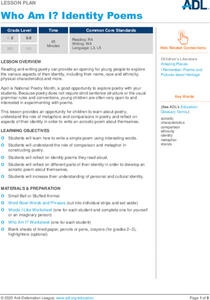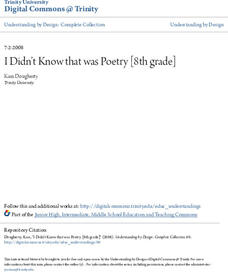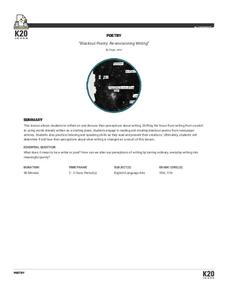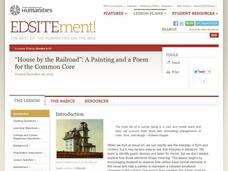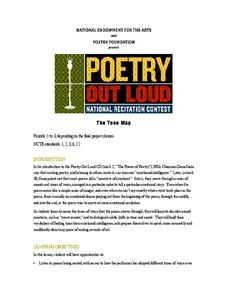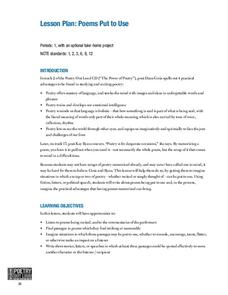Scholastic
Using Poetry to Explore Change and Belonging
Change, growth, and a sense of belonging are the focus of a unit that uses poetry to explore these themes and the distinguishing features of poetry as well.
Anti-Defamation League
Who Am I? Identity Poems
A lesson celebrating identity begins with a something-about-me activity, then moves on to writing favorite words. Class members then brainstorm metaphors and comparisons and read a poem to inspire their poetic abilities. Scholars craft...
Trinity University
I Didn’t Know that was Poetry
Poetry or prose? That is the question facing middle schoolers as they begin a month-long poetry unit by examining the characteristics that differentiate poetry and prose writing. Pupils learn about poetic devices and different types of...
K20 Learn
Blackout Poetry: Re-Envisioning Writing
Shed light on the beauty of language with a great poetry activity. After learning about Austin Kleon's blackout poetry model, pupils respond to some of his poetry and use it as a model to produce their own. Young writers also share their...
Academy of American Poets
Women in Poetry
Imagine linking poetry to technology! Thirty-three lessons comprise a 6-week "Women in Poetry" unit for high schoolers. Class members research women poets, learn how to respond electronically to discussions, write their poems, create web...
Annenberg Foundation
Rhythms in Poetry
Rhyme, rhythm, free verse, imagery: Do these words describe poetry, or jazz music? The answer is both! A resource explores these similarities as scholars watch a video, engage in discussion, read author biographies, write poetry and...
Annenberg Foundation
Poetry of Liberation
How do writers use words to protest injustice, challenge the status quo, and shape their own identities? Individuals watch and discuss a video, read author biographies, write poetry and journals, develop a slideshow, and complete a...
Poetry Class
Eccentricity and Sound
What do Lady Gaga and Dame Edith Sitwell have in common? As they examine Sitwell's poetry, class members learn that the similarities are far more than their unique appearance.
Curated OER
Rhythm and Improv, Jazz and Poetry
Connect the ideas of jazz improvisation and art to writing poetry. Learners collaborate and write different lines of poetry, imitating the jazz styles of improvisation and freewriting. Take a close look at the poems "Tenebrae" by Yusef...
Curated OER
"Take my Advice": Poems with a Voice
Discuss the meaning of the phrase tone of voice with the class. They respond to a variety of scenarios where a particular tone would be prevalent. They then read "Mother to Son" without knowing the title and answer some questions about...
Curated OER
Lesson: Paul Chan: Alternumeric Fonts
Learning to analyze language, symbols, and codes is part of becoming a deep and critical thinker. Young analysts consider their ability to see hidden messages as they analyze the work of Paul Chan. There are two fully developed...
National Endowment for the Humanities
“House by the Railroad”: A Painting and a Poem for the Common Core
Introduce your class to ekphrastic poetry with an exercise that asks them to examine Edward Hooper's painting House by the Railroad and Edward Hirsch's poem "Edward Hopper and the House By the Railroad." After a close reading of the two...
Crafting Freedom
George Moses Horton: Crafting Virtual Freedom Through Poetry
What is "virtual freedom"? How about "enslaved entrepreneurship"? Class members will learn about these terms and much more as they read the poems and examine the life of George Moses Horton.
Core Knowledge Foundation
Unit 1: Contemporary Fiction - They Call Me Güero: A Border Kid’s Poems by David Bowles
They Call Me Güero: A Border Kid's Poems by David Bowles is the focus of a five-week language arts unit unit. Fifth graders listen to various poems and participate in thoughtful discussions, examining vocabulary and learning new words in...
KIPP 3D Academy
Epic Poetry Unit
The Odyssey is the core text in this unit study of the hero's journey motif. Along the way, kids research Greek and Roman history, mythology, art, and epic poetry. The 104-page packet is perfect for homeschool or classroom situations and...
Curated OER
Lesson: Impressions
Here, Autumn Poplars is the painting upper graders will analyze. They look at techniques, time period, and the use of impressionism to convey a natural theme. They go outside to make observations of nature and use what they see to write...
Curated OER
The Tone Map
Poems are meant to be heard. Hearing a poem being read enriches one’s understanding of the tone and mood of the piece. Introduce your class to the sounds of poetry with a packet that not only details how to use poetry recordings in the...
Curated OER
War Literature
Working in groups, young historians review a war poem written by Stephen Crane. After reviewing the poem, they present an oral interpretation of the poem and hold a panel discussion about their analysis. The panel is made up of five or...
Curated OER
Exploring Race Through Literature
Provide your class with an opportunity to examine race through a variety of literary works. They read and analyze a chosen poem, interview, speech, or story describing race in America. They then use key words from the original work to...
Curated OER
Lesson: Paul Chan: 1st Light and 5th Light
Paul Chan's latest exhibit includes seven manifestations of light. Today, kids analyze the pieces 1st Light and 5th Light. They consider the concept of opposed or dualistic realities found in literature, society, and Chan's work. They...
Poetry Out Loud
Poems Put to Use
Why do we have to study poetry? Here is a lesson that demonstrates some of poetry's more practical and real-world applications for reluctant learners. Start by leading a brainstorming session about where poems or pieces of poems might be...
Curated OER
Lesson Plan: Letting Go
Why would an artist destroy his own work? Kids examine the Malagan practice of creating and then destroying art. They talk about the cultural and spiritual significance of this practice, as well as how it relates to consumerism in...
Curated OER
Monsters
Do monsters really exist? Find out what your class thinks with these discussion questions prior to reading Beowulf. Incorporate music and a video clip into the anticipatory set to engage your learners. Take a day to search online for...
Curated OER
Lesson: Paint Inspiring Words
The painting Three Young Girls circa 1620, was believed to be painted after the death of the subjects' mother. Art enthusiasts analyze the image details to determine if they come to the same conclusion. They then use the sensory details...
Other popular searches
- Writing Poetry Onomatopoeia
- Writing Poetry Third Grade
- Writing Poetry and Prose
- Creative Writing Poetry
- Writing Poetry Rhyming Poems
- Descriptive Writing/poetry
- Writing Poetry Unit
- Writing Poetry Lesson Plans
- Poetry Writing Workshop
- Writing Concrete Poetry
- Writing Poetry On
- Teaching Poetry Writing



